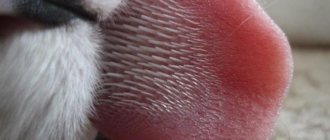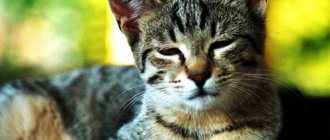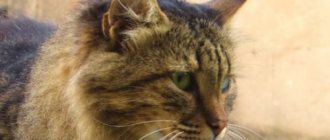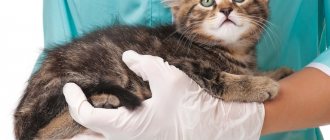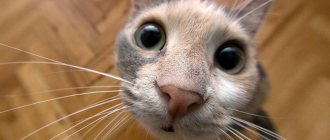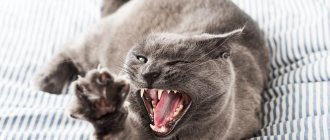Pet lovers sometimes notice that a cat breathes with its tongue hanging out. In most cases, this phenomenon touches the owners. They simply don't care about it. But there are also breeders who closely monitor the cat’s behavior. So, sticking out a pet's tongue makes them panic. But should you worry if a cat sticks out its tongue, and what are the reasons for this?
Language functions
To understand why a cat sticks out its tongue, you first need to understand what functions this muscular organ performs. A cat's tongue performs a number of important functions:
- helps in the process of swallowing, nutrition;
- allows you to recognize the taste of food;
- allows for hygiene procedures.
In its normal state, the tongue is located in the mouth. But there are times when the owner complains that the cat constantly sticks his tongue out. But this phenomenon is not always considered pathological. There are also physiological reasons why a cat sticks out the tip of its tongue.
When a cat's tongue sticks out is normal
Veterinarians will name many pathologies in which a cat sticks out its tongue. However, we are not necessarily talking about illness. Do not panic ahead of time if you notice strange behavior in your pet. There are many situations in which a cat’s tongue sticking out is normal. Among the most common are the following :
- The animal is as relaxed as possible . As a rule, this happens during sleep. The tongue, like any muscular organ, should also rest. After all, it already has a lot of functions that tire it. During relaxation, the cat's tongue becomes slightly longer than when it is tense. So it sticks out of the mouth. This feature is unique to pets. Cats living in the wild cannot afford to relax for a second. They are tense even in their sleep, and they always keep their tongues shut.
- Cats stick out their tongues due to the heat . The pet's heat exchange has been disrupted. It is urgent to give him something to drink and move him to a cool place if the cat is in the sun. Without doing this, you can bring the animal to heatstroke.
- Malocclusion is another common reason for a cat sticking out its tongue . The abnormal structure of the jaw is to blame, in which it is shorter than necessary; the organ simply does not fit in the mouth. Malocclusion is common in artificially bred elite breeds. Sometimes this becomes a real shock for cat owners who dream of world fame for their pet. After all, with such a defect, an animal, even if it is of royal blood, will not be able to participate in exhibitions and other prestigious events.
- Another reason is simple forgetfulness. The cat sometimes just gets distracted. Periodically forgets to hide his tongue even after hygiene procedures. This happens, for example, when she was washing her face and the owner called out to her. The cat turned around, but didn’t have time to hide his tongue. As a result, the cute photo is ready.
As you know, cats are very smart and quick-witted animals. Many of them are well trained, and Kuklachev’s wards are an example of this. So, some cats, having stuck out their tongue involuntarily a couple of times and noticing that the owner was delighted, can then do this on purpose in order to attract the precious attention of the owner and other people. Of course, this is a fairly rare reason for a cat sticking its tongue out at you. Only the most vain (or those experiencing acute attention deficit) or overly intelligent individuals do this.
© shutterstock
Physiological reasons
Veterinarians identify the reasons why a cat sticks out its tongue:
- Relaxation. During rest and sleep, the jaw muscles are maximally relaxed, which leads to prolapse of the muscular organ.
- Thermoregulation. If a cat is hot, it sticks out its tongue, thereby trying to normalize the temperature.
- Absent-mindedness. A cat may simply forget to retract its tongue after licking fur or active games.
- Bite. Due to malocclusion, the tongue simply does not fit in the cat’s mouth. That's why it sticks out. Such pets do not qualify for participation in competitions and exhibitions based on their appearance.
- Childbirth. Before the expected birth, the cat's behavior changes. She becomes excited, her breathing quickens, her mouth is slightly open, her tongue sticks out.
- Praise. The cat sticks out its tongue in response to praise. If the owner is constantly touched by the sight of a cat with a hanging tongue, then the animal will systematically carry out such an action for the sake of approval.
- Hunting. When hunting, cats involuntarily stick out the tip of their tongue. This is due to the fact that in this position of the muscular organ the animal’s sense of smell increases.
- Age. A cat who has crossed the age of 8 may have loose teeth and fall out. From the cracks that appear, the tongue freely looks out of the oral cavity.
Interesting fact: scientists were able to prove that a cat’s tongue grows by several millimeters during sleep. Therefore, during rest, the owner may notice the tip of the pet’s tongue sticking out.
Mr. Cat explains: diseases
But in some cases, a protruding tongue indicates the presence of certain pathologies in the animal.
If for no apparent reason your pet sits like this for a long time, this is a reason to sound the alarm and go to the veterinary clinic.
Respiratory diseases
A sign of many respiratory diseases and colds is a protruding tongue. These can be acute respiratory viral diseases, rhinitis, tracheitis, bronchitis, pneumonia. The situation is aggravated by coughing, sneezing, shortness of breath, wheezing and wheezing, as well as mucus flowing from the nose.
Cardiovascular failure
With vascular pathologies, breathing problems always arise, since all tissues of the body do not receive enough oxygen.
If you experience severe shortness of breath with a protruding tongue, which is a sign of cardiomyopathy, pulmonary edema may develop. The animal breathes through its belly.
Other symptoms include loss of appetite, blue discoloration of the mucous membranes of the mouth, wheezing when breathing, tachycardia, and impaired coordination of movements.
Coronary heart disease, angina pectoris, hypertension can also be accompanied by the cat's tongue sticking out during rapid breathing.
Poisoning
In case of poisoning, the pet experiences the urge to vomit, causing the tip of the tongue to stick out. This symptom is usually accompanied by other dyspeptic symptoms - bloating, drooling, diarrhea.
Kidney failure
If the tongue sticks out due to kidney failure, then the pet most likely also has a strong ammonia odor from the mouth, increased thirst and a frequent urge to urinate.
Nausea and diarrhea, yellowness of the mucous membranes of the mouth, oily hair, lethargy and apathy may be added.
Infectious diseases
With infectious and viral diseases of cats, the picture is almost the same as with colds. But conjunctivitis, painful crusts on the nose and ulcers around the mouth are added. These may be rhinotracheitis and calcivirosis.
Inflammation in the mouth
The first thing to do if your pet is breathing heavily for no apparent reason, sticking out his tongue, is to examine the oral cavity. If there are ulcers and sores there, then it is most likely gingivitis or stomatitis.
Added to the symptoms are an unpleasant putrid odor from the mouth, decreased appetite, and refusal of solid food.
Tumors
Malignant tumors such as cancer of the tongue, throat, palate, and jaws can cause involuntary frequent protrusion of a cat's tongue.
The situation is aggravated by bleeding, severe bad breath, hoarseness, and refusal to eat.
A similar picture may occur with benign formations, for example, polyps.
Increased body temperature
A protruding tongue can occur not only due to external heat; fever also forces the animal to look for an opportunity to cool down. And high temperature, in turn, serves as a concomitant symptom of many diseases.
Functional brain disorders
If your pet has a brain tumor or head injury, then a constantly protruding tongue will certainly be added to the lack of coordination of movements, lethargy and general decreased tone.
Foreign body
A protruding tongue can serve as a signal that the cat has swallowed some small object and it is stuck in the teeth or respiratory tract, preventing the full supply of oxygen to the lungs.
In this case, there may be salivation and lacrimation, sneezing, coughing, mucus discharge from the nose, and refusal to eat.
Allergy
This reaction is often accompanied by swelling of the airways and larynx, which causes shortness of breath, difficulty breathing and, as a result, a protruding tongue.
Injuries
Jaw injuries can cause a similar reaction. When it is dislocated, the cat cannot close its mouth at all, there is also drooling and a complete refusal to eat.
Stress
The cause may be stress in cats. We will look at the symptoms and treatment below.
If the pet is stressed, the tongue will stick out. For example, when driving a car, if the cat is afraid, then the tongue will hang out the whole way. Fear, nervous shock, negative emotions are the reasons that cause stress in cats. When an animal is nervous, the following symptoms appear:
- tongue sticking out;
- the cat is shaking;
- the pet is trying to hide;
- meows constantly.
If the cat is scared, the symptoms may recur. Therefore, the animal requires treatment. He needs to be provided with complete rest. If necessary, the veterinarian will prescribe sedatives.
Why does a cat breathe frequently from its belly?
The normal breathing rate for a cat is considered to be from twenty to forty exhalations per minute. However, there are situations when a pet’s breathing is impaired. When a cat breathes with its stomach, the lungs and chest cannot cope with their functions, since in a normal case a vacuum forms around the lungs in the chest cavity and allows the organs to have space. Due to certain problems with the body, both air and blood along with harmful substances can enter the cavity. This may also be due to increased physical activity, various pathologies and severe climatic conditions. This can also be caused by the onset of labor in a cat and stressful situations. Any of these options will be a reason to visit a doctor.
Diseases
Veterinarians identify the main reasons why a cat sticks out its tongue:
- allergies that cause swelling of the throat;
- inflammation of the gums, mouth;
- dental diseases;
- amyotrophy;
- improper functioning of the salivary gland;
- skull injuries.
You can often see a cat with its tongue hanging out after anesthesia. During this period, the animal cannot yet control its jaw independently. The oral cavity closes completely only 24 hours after surgery.
What is considered normal
Why a cat tramples its paws: the main reasons and what it means
Natural reasons for the tongue to fall out of the mouth are forgetfulness (for example, when licking) and relaxation of the pet, when the tongue lengthens and can stick out. In addition, in stressful situations and nervous tension, the cat may clamp its tongue between its teeth. This can also be observed with an incorrect bite or in the event of a change of teeth (in kittens). It is also considered normal to bite the tongue in hot weather or during labor, when the cat is trying to alleviate pain.
Natural causes should not bother the owner
A cat with its tongue hanging out is a very cute sight, but owners of furry pets should take a closer look at the animal, especially if this behavior has been observed for a long time. If the pet shows its tongue in cases that are considered non-critical, immediately puts it in its mouth when the condition has stabilized and looks healthy and cheerful, then there is nothing to worry about.
But if it is difficult for a cat to control his tongue, and uncharacteristic changes are noted in his behavior (hoarseness of voice, difficulty breathing and lack of appetite), then it is necessary to urgently contact a veterinary clinic. If the correct diagnosis is carried out in a timely manner and emergency care is provided to the animal, this can save its life. Particular attention should be paid to baby kittens and older cats, as it is most difficult for them to point out the problem and tolerate painful conditions.
Signs of diseases
Veterinarians identify a number of symptoms that, together with a protruding tongue, indicate various diseases:
- difficulty breathing;
- the cat is lethargic and does not play;
- the pet becomes aggressive;
- the oral mucosa is red, and sometimes a bluish tint appears;
- dry mucous membrane;
- lack of appetite;
- wounds, mouth ulcers.
If your cat develops the above symptoms, you need to immediately take him to the clinic for examination.
The cat is breathing with its tongue hanging out - what to do?
Heavy breathing with a protruding tongue is often observed if the cat has broken ribs. Perhaps this happened during an active walk, or pampering. Cats, despite their plasticity, can also fall and break ribs.
The cat is breathing with its tongue hanging out, what to do:
- In this case, take a closer look at the deformation of the chest and the presence of other injuries. However, there may be more serious symptoms, which are indicated by heavy breathing with an open mouth.
- If your pet has a cold, mucous may accumulate in his nose. That is why breathing through the nasal passages is impossible, so the cat inhales through the mouth.
- It is necessary to treat a cold in an animal. The infection can spread from the upper respiratory tract to the lower. Therefore, it is necessary to prevent the occurrence of bronchitis or pneumonia.
The kitten is tired
Heat
The main physiological reason why a cat sticks out its tongue is temperature regulation. The animal protrudes the organ to reduce discomfort, for example, during heat. This prevents the development of heat stroke. In this case, the owner should take the cat to a cool place and pour water on it.
But a cat's tongue sticking out can also be a signal of high body temperature. To understand whether your pet is suffering from heat or is sick, you need to figure out what temperature is considered normal in cats.
The normal temperature for a cat is 38-39 degrees. But don’t panic right away if the indicator deviates slightly from the norm. Here are the common reasons for the thermometer to shift:
- immediately after sleep, the thermometer drops by a couple of divisions;
- in the evening the cat’s body temperature will be higher than in the morning;
- Kittens have a slightly higher temperature than adult animals.
If the temperature rises due to illness, you should not self-medicate - the animal should be taken to the veterinarian.
The cat opens its mouth and breathes like a dog: reasons
There are also pathological reasons that require doctor's intervention.
The cat opens its mouth and breathes like a dog, reasons:
- If you notice that your cat's rapid breathing with an open mouth and protruding tongue is in no way associated with stress or increased ambient temperature, observe how long this happens.
- It is necessary to pay attention to the accompanying symptoms. These may include vomiting, nausea, loss of coordination, and wheezing. In most cases, cats inhale this way when foreign bodies enter the respiratory tract.
- It could be wool or food debris. This often happens if a pet eats very quickly and tries to get enough quickly.
Pet
Cardiovascular diseases
The heart is an important organ. Any disturbances in the functioning of the cardiovascular system are dangerous to the life of the animal. Due to chronic or acute heart disease, oxygen does not reach vital organs in sufficient quantities.
Improper heart function is accompanied by symptoms:
- the cat is lethargic, there is practically no movement;
- heart rhythm is abnormal;
- rapid breathing;
- tongue sticking out;
- The oral mucosa has a bluish tint.
Any disturbance in breathing or heart rhythm is a signal from the cat’s body about the need to visit a veterinarian. Lack of help can lead to the death of the animal.
Diagnosis and prevention of diseases
To correctly diagnose respiratory diseases in cats, it is necessary to organize disease prevention and treatment. First you need to study the cat's medical history and the results of a physical health examination. The upper respiratory tract is examined using an x-ray, and it is performed in the presence of diseases of the lower respiratory tract, for example, cough, difficulty breathing or rapid breathing. Doctors often use devices to examine the nose, throat, and respiratory system. If there is a suspicion of a lung disease, it is necessary to analyze what is contained in the lungs and respiratory system by washing the trachea or sacs with a sterile liquid and further studying the resulting liquid. This procedure is called transtracheal flushing.
Cats that have a lot of fluid in the pleural area need to have it pumped out using a special needle, and then this fluid is examined under a special microscope. If there is a lot of fluid, then this is the cause of possible heart disease; for a more complete result, an electrocardiogram procedure is necessary.
Prevention is that cats develop diseases as a result of stress, certain health problems, climate conditions, as well as dust, dampness, and drafts. Some types of diseases can be cured through vaccination. However, in any case, it is necessary to comply with sanitary standards for keeping cats.
Poisoning
Poor nutrition and poor quality food can lead to poisoning of your pet. The owner may notice characteristic symptoms:
- cough;
- urge to vomit;
- vomit;
- bloating;
- diarrhea;
- increased intestinal motility;
- gurgling in the stomach.
Due to frequent vomiting, the cat sticks out its tongue. Since pathological signs are present, it is impossible to confuse cat diseases with a physiological norm.
Diagnosis of respiratory organs
Diagnostic methods in the clinic are aimed at identifying the causes of choking, coughing and shortness of breath and consist of:
- collecting anamnesis (finding out medical history). At this moment, the main role is assigned to the cat's owner. It is he who must tell about the signs, frequency, rhythm, strength of cough and shortness of breath, how long ago the first case was recorded, whether there is discharge and what other signs were recorded in the animal; • examination and palpation (oral and nasal cavity, trachea and esophagus, thoracic cells for integrity);
- auscultation (listening) of the bronchi and lungs;
- thermometry;
- if necessary, chest X-ray examination;
- performing endoscopy of the trachea;
- carrying out bacterial culture of nasal secretions for subtitration of microflora sensitivity to antibiotics;
- general blood analysis;
- blood chemistry;
- ultrasound examination of the chest cavity;
- analysis of fecal matter for worm eggs;
- thoracentesis (taking the contents of the chest cavity for examination).
Of all the listed diagnostic methods at home, you can carry out inspection, palpation, thermometry and auscultation. Often these methods are not sufficient to establish a diagnosis and prescribe treatment.
Functional brain disorders
Veterinarians identify the causes that lead to disruption of the brain and nervous system:
- traumatic brain injury;
- past infectious diseases;
- stroke.
The above reasons lead to a lack of coordination: the cat cannot independently control movements or control muscles. So he sticks out his tongue.
Veterinarians offer a small test that helps make sure that your cat has no neurological problems. If the animal sticks out its tongue, you need to touch it a little. If there are no neurological problems, the cat will quickly hide its tongue. If the actions do not bring results, we can talk about a pathological signal from the body.
Why does a cat breathe frequently during heat?
Often the cause of an open mouth can be estrus, or sexual heat. At this time, hormones are raging in females and males, a huge amount of them is released into the blood, which can increase blood pressure and increase breathing. So don't be surprised if your cat is in heat and breathes through her mouth with her tongue hanging out.
Why does a cat breathe frequently during heat:
- But there can also be very serious reasons for a cat breathing through its mouth. Among them are oncological diseases. There may be a cough with mucous, purulent and bloody discharge. In this case, you need to consult a doctor.
- Scientists have proven that obese cats can also breathe with their mouths open. Just as fat people experience shortness of breath and heavy breathing due to obesity, the same thing happens in cats. It is difficult for them to perform even the simplest physical activities, which in turn leads to heavy breathing, the cat is forced to open its mouth and stick out its tongue.
- With some diseases of the liver, kidneys, and excretory system, there may be breathing with an open mouth. This is usually observed with pyelonephritis, or severe liver dysfunction.
Cat
If you notice that your pet is breathing with its mouth open, but there are no other symptoms, and heavy breathing is associated with physical activity, there is no reason to worry. However, if the animal breathes for several hours or even days with its mouth open and tongue hanging out, this is a reason to urgently contact a veterinarian. Perhaps, if you consult a doctor in a timely manner, you will be able to save your pet from imminent death.
How to help at home?
First of all, examine the cat’s oral cavity and look into the throat:
- if the cat is breathing heavily with his mouth open, and strong wheezing, gurgling, whistling is heard in the chest, or fluid is flowing from the mouth and nose, immediately take him to a specialist. There is nothing you can do to help, and a delay may cost the animal its life;
- if the mucous membrane of the mouth and gums are too pale, with a purple or blue tint, then the cat is suffocating. If he has almost stopped breathing, you need to give him artificial respiration.
